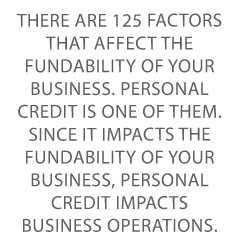
What You Need to Know About How Personal Credit Impacts Business Operations
There are 125 factors that affect the fundability of your business. Personal credit is one of them. Since it impacts the fundability of your business, personal credit impacts business operations.
Personal Credit Impacts Business Operations in More Ways Than One
Fundability is the obvious one. This is the ability of your business to get funding. If you don’t have funding for your business, it can’t operate.
However, there are more subtle effects as well. For example, if you are worried about your personal finances, business decisions can suffer. You may be more tempted to make decisions based on trying to control personal issues, rather than what is best for the business. Personal financial issues can distract you from running your business well.
Control What You Can, Mitigate What You Can’t
Bad credit doesn’t have to be the downfall of your business. Some factors are out of your control. Others are not. The key is to know what is causing the problem, fix what you can, and mitigate the rest.
One way to mitigate personal bad credit and its negative impact on business operations is to build strong business credit. It can also help to know which types of funding rely most heavily on the credit score from your personal report.
Until you improve your credit, you may not qualify for a traditional business loan. However, there are other options.
Your Personal Score Even Affects the Types of Funding You Can Get
While you are working on improving your credit score, you don’t have to be stuck without funding. You just have to find those types of funding that you can qualify to get with a less than ideal credit score.
Invoice Factoring
If you have open invoices and offer credit to customers in some form, then you can get paid faster with invoice factoring. Usually, this involves invoices with net terms, such as net 30, 60, or 90. You turn those invoices over to a factoring company, and they give you an agreed upon percentage of the total of the invoices. You get this amount of money immediately, and when your customer pays, the factoring company keeps their agreed upon fee while sending the balance to you.
Merchant Cash Advances
A merchant cash advance (MCA) technically isn’t a loan. Rather, it is a cash advance based upon the credit card sales of a business. A small business can apply for an MCA, and have an advance deposited into its account fairly quickly. This is ideal for business owners who accept credit cards and are looking for fast and easy business financing.
A lender will review 3 months of bank and merchant account statements, looking for consistent deposits. They’ll also verify revenue of $50,000 or higher per year and a time in business of 6 months or longer. A lot of Non-Sufficient-Funds (NSFs) showing on your bank statements will likely be a deal breaker, as will excessive chargebacks on merchant statements.
Basically, they want to see that you manage your bank and merchant accounts responsibly. Of course, a decent number of consistent credit card transaction deposits each month is important for this type of financing as well.
Alternative Lenders like Fundbox
Fundbox offers a revolving line of credit for up to $100,000 and will auto debit your weekly payment from your bank account. They connect directly to your online accounting software. You pay in equal installments over the course of a 12 or 24 week plan.
You do need to have a 600+ personal FICO score and $100,000+ in annual revenue, and you must have a business checking account. Ideally, you will also have 6 months in business or more.
Can You Fix Personal Credit?
If you have bad credit, it needs to be fixed. How do you do that? The short answer is, pay your bills. Still, if you already have bad credit, it will take some time for that to make a difference.
Also, make sure your credit report is current and free of mistakes. YIn fact, you can get a free copy of your credit report annually.
The three main reporting agencies when it comes to personal credit are:
- Equifax,
- Experian, and
- TransUnion
You can get a free report from all three each year. How?
Per FTC.Gov:
“You’re entitled to one free copy of your credit report every 12 months from each of the three nationwide credit reporting companies. Order online from annualcreditreport.com, the only authorized website for free credit reports, or call 1-877-322-8228. You will need to provide your name, address, social security number, and date of birth to verify your identity.”
Once you get your report, read it carefully and make certain all of your information is correct. Contact the appropriate credit agency in their preferred manner if you find a mistake. Each agency has its own procedures for corrections. Generally, you can find them on their website. Online options for disputes are more common now due to the pandemic.
These steps will help you get a jump on improving your credit score.
Credit Monitoring
In addition to a free copy of your credit report each year, there are free monitoring services that will give you an updated credit score each month. New information that has been posted to your credit report is available with some of these services. As a bonus, some will offer suggestions as to which factors are dragging down your score. Some of these services even provide real-time credit updates for a fee.
Good Personal Credit Also Affects Business Operations
Of course, a good FICO score will impact business operations as well. Business lenders will generally look at personal credit when you apply. Consequently, good credit will not only help you get approvals, but better rates and terms also.
Maintaining good credit is important for a number of reasons. Keeping your business running is one of them.
The post What You Need to Know About How Personal Credit Impacts Business Operations appeared first on Credit Suite.

